A sample text widget
Etiam pulvinar consectetur dolor sed malesuada. Ut convallis
euismod dolor nec pretium. Nunc ut tristique massa.
Nam sodales mi vitae dolor ullamcorper et vulputate enim accumsan.
Morbi orci magna, tincidunt vitae molestie nec, molestie at mi. Nulla nulla lorem,
suscipit in posuere in, interdum non magna.
|
By júlia verdaguer, on desembre 5th, 2013% Hello!
We are Susan and Rosa from Voramar School in Barcelona.
I’m Rosa, Susan’s tutor this year. I’m one of the English teachers at secondary and I also do French classes and I’m in charge of the Language Seminary at my school. Since Susan’s arrival we’ve been working together in different things, and our students have been enjoying the activities she’s prepared so much.
What we like the most about Susan is her character and personality. She’s always very kind to everybody at school and even the teachers who had never spoken English before, feel like speaking to her!
Our first project together was HALLOWEEN. She was working with our students from 5th Primary to 4th ESO above all on the differences and things in common between our cultures on that day. Eventually, she decorated the hall of the school ( we leave you a few photos of it).
 Susan decorated the school hall for Halloween  Halloween activities
And now, Susan’s thoughts:
I’m Susan and I’ am enjoying my time here in Voramar school. I have felt very welcomed by all the students and teachers, everyone is very nice and they are helping me to learn some Spanish and Catalan. I love the students they are friendly and at times very funny! I like to learn about their culture and compare the differences and similarities’ between both are two countries. I tried my first Castanyes (conkers) and panellets which are eaten around Halloween time here in Barcelona and they are very tasty. I recently have been focusing on our traditions in the UK and USA for Halloween and how we celebrate it and why. I found that here they have a bigger lunch or (Dinar) than the UK which is also very tasty and I also found out that at Christmas or (Nadal) that here they have a log called Tió which they place presents inside of, then on Christmas morning children sing and hit it with a stick until the presents come out. I found this to be the most different of the traditions but also a very fun one.

By júlia verdaguer, on desembre 3rd, 2013% Pamela is a Conversation Assistant at Escola Pia Balaguer. Her tutor, M. Àngels, has sent us a nice interview that the students of 6th grade, guided by their English teacher, prepared to get to know Pam a little better.

Click on the image or here to watch the interview!
Thank you, M. Àngels, Pam and 6th grade students for sharing this activity with us.
By júlia verdaguer, on octubre 4th, 2013% Barreja d’alegria i nerviosisme. Això és el que van sentir aquest cap de setmana els 141 Auxiliars de Conversa que van aterrar a Catalunya el passat divendres de la mà de la FECC i Home to Home per donar suport al Projecte Escola Multilingüe de les escoles de la Fundació Escola Cristiana. Durant tot el dia van anar arribant a l’aeroport de Barcelona auxiliars des del Regne Unit, Irlanda, Estats Units, Canadà, Austràlia i, aquest any per primera vegada, Sud-Àfrica.
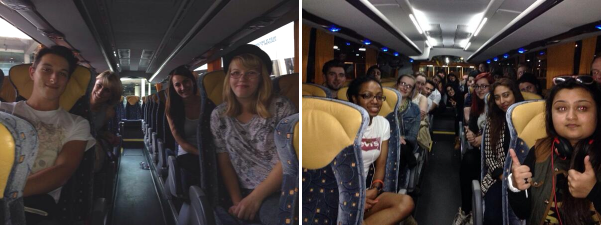 Els auxiliars, cap a Martí Codolar
Des de l’aeroport, els Auxiliars van anar traslladant-se a la Residència Salesiana Martí Codolar en autocar. Allà van passar la tarda fent activitats i jocs que els van proporcionar idees per fer servir a les escoles on desenvolupen la seva tasca, cosa que també els va servir per conèixer-se entre ells.
El dissabte al matí, després d’esmorzar, van tenir lloc les sessions de formació per als Auxiliars. En la primera sessió, a càrrec de Juanjo Fernández, els auxiliars van rebre informació sobre el sistema educatiu català i les escoles Cristianes. Sonia Jalle, de l’escola Jesús Maria Sant Andreu de Barcelona, els va parlar sobre com ser el millor hoste a casa de les famílies acollidores i d’algunes de les diferències culturals més importants entre els anglosaxons i els catalans. Finalment, Carme Santiago, de l’escola Padre Damián Sagrados Corazones de Barcelona, els va explicar com ser bons Auxiliars de Conversa a les escoles.

Per gentilesa de Cambridge University Press i Richmond, els Auxiliars van ser obsequiats amb diccionaris català-anglès i castellà-anglès, els quals els faran un bon servei, ja que tots els nois i noies seguiran cursos de català o castellà (podran triar diverses opcions, simultànies o successives, amb més o menys tutorització) organitzats per l’Institut Ramon Llull o l’Instituto Cervantes.
 A punt per entrar a les sessions de formació
Després de les sessions formatives, van començar a arribar les primeres famílies acollidores per a recollir els Auxiliars que passaran uns mesos a casa seva, convivint amb ells com un membre més de la família.
 Famílies i professors de FEDAC Sant Andreu i FEDAC Horta amb els seus auxiliars de conversa
Així s’iniciava el que esperem que sigui una gran amistat entre els Auxiliars i les famílies que els acullen, així com una gran experiència per als alumnes, mestres i professors de les Escoles Cristianes. Tot plegat, una bona arrencada. Are you ready?
By júlia verdaguer, on setembre 4th, 2013%  Com bé sabeu, ja falten pocs dies perquè arribin els primers auxiliars de conversa a les escoles i a les de les vostres famílies acollidores. Com bé sabeu, ja falten pocs dies perquè arribin els primers auxiliars de conversa a les escoles i a les de les vostres famílies acollidores.
Aquestes famílies que, generosament, acullen els auxiliars de conversa són un pilar fonamental per al programa. Potser les famílies interessades de la vostra escola no van tenir ocasió de venir a la reunió informativa que vam realitzar abans de l’estiu, o encara no s’havien plantejat ser família acollidora. Per això, sabent l’esforç que feu des de l’escola per poder trobar aquestes famílies, des de l’organització del Programa Auxiliars de Conversa hem convocat una altra sessió informativa adreçada a les famílies acollidores, el proper dijous 19 de setembre a les 18:00 a la seu de la Fundació Escola Cristiana de Catalunya (c. dels Àngels 18, 4a planta, 08001 Barcelona)
En aquesta reunió, tan propera a la data d’arribada dels auxiliars, parlarem de què suposa acollir un auxiliar de conversa a casa, com podem facilitar la seva integració a la família i al nostre país i, és clar, donarem resposta a totes les preguntes que pugueu plantejar-nos. Pot ser molt útil tant per a les famílies de la vostra escola que ja s’han compromès a acollir l’auxiliar i volen resoldre algun dubte que els pugui quedar, com per aquelles que potser volen acollir l’auxiliar durant el segon o tercer trimestre.
Aquelles escoles que encara no hagueu trobat famílies acollidores, podeu animar a les famílies indecises del vostre centre a venir, pot ser una molt bona oportunitat perquè acabin de decidir-se!
Si us plau, us demanem que ens confirmeu l’assistència per correu electrònic a l’adreça pac@escolacristiana.org.
By júlia verdaguer, on maig 20th, 2013% Hamish, Conversation Assistant at Escolàpies Llúria, has shared with us this fun game idea, that he put into practice with his 1-ESO students. Thanks a lot 🙂
………………………………………………………..
 In February, in our weekly 1º ESO speaking classes, we did something a little different. The kids were given paper, and told to fold it into a fun flap (if you aren’t familiar with the name, you’re not alone; I’d never heard the name before, even though I was familiar with the game, and it took my colleague Rosa Maria several years of research to find the correct name). In February, in our weekly 1º ESO speaking classes, we did something a little different. The kids were given paper, and told to fold it into a fun flap (if you aren’t familiar with the name, you’re not alone; I’d never heard the name before, even though I was familiar with the game, and it took my colleague Rosa Maria several years of research to find the correct name).
Once they had their fun flaps folded and ready, they began the English work. The aim was to practise asking and answering questions in the present simple. On each flap, the students wrote a question using sentence starters like ‘How often do you…?’ and ‘Do you ever…?
 Whilst they were making their fun flaps, I was walking round the class, helping with grammar and springing questions on them with a fun flap I’d made earlier. Questions written, the activity began; in pairs, the students played with the fun flaps, asking and answering questions at random, until, at our signal, they changed partners and started again. Whilst they were making their fun flaps, I was walking round the class, helping with grammar and springing questions on them with a fun flap I’d made earlier. Questions written, the activity began; in pairs, the students played with the fun flaps, asking and answering questions at random, until, at our signal, they changed partners and started again.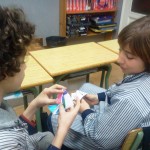
The students really enjoyed the activity; it was something different from what they were used to, and it also gave them the chance to write their own questions. Thinking of their own conversations in English meant that they could have fun with their friends in th e language. e language.
This activity has worked well for lots of other groups as well; in sixth of primary we used fun flaps to work on superlatives, which questions like ‘What is the most beautiful city in your country?’, and in fourth of primary to work on describing animals.
By júlia verdaguer, on maig 14th, 2013% For our school, Sagrado Corazón – Corazonistas (Barcelona), this is our first time in the Programme. Our conversation assistant, Andrew, comes from Canada. He teaches students from the fifth year of primary school to students in their second year of batxillerat, all of whom are really enjoying this enriching experience so much.
As his tutor, I would like to use this piece of writing to thank Andrew for bringing such interesting and fun moments into our classrooms and for sharing his culture, sense of humour, original ideas and adventures with all of us.
Xavier Asensio
Here are some thoughts from Andrew about his experience in Barcelona so far:
Each person that is a part of this program decided to come aboard for different reasons. But the main reason I decided to take on this adventure was to gain experience as a teacher. What better way was there to see what it was really like to be a teacher than to, you know, be a teacher! And it doesn’t hurt that I can do this in an incredible city like Barcelona!
Before I left for Barcelona I applied to some teachers colleges for next September. I was hoping that the CAPS program would be a good opportunity for me to grow and learn in a formal classroom environment. I have had numerous and varied teaching and coaching experiences in the past but this one is unique and particularly applicable to my future career.
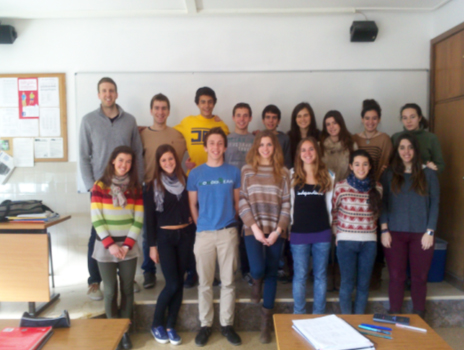
So far my experience here at Sagrado Corazon – Corazonistas has been a very enjoyable one. When I first arrived here I quickly noticed the Spanish hospitality and was warmly welcomed into the school community. Even though I didn’t know any Spanish at first, everyone tried to make me feel as comfortable as possible. For me, this has been an extremely important aspect of my experience thus far. In all honesty, even though it is where I work, it has been the place where I have have many of my most memorable experiences. I have developed many close friendships with locals and teachers and many of them have gone out of their way to show me around and help me discover the city. I have also enjoyed getting to know my students better as well. One of my favourite experiences this year was accompanying the 4 ESO class to Llivia for a 4 day ski trip to the Pyrenees.
As far as what I actually do here, I am a conversation assistant for about 16 different classes ranging from 5 primary to 2 bachillerato (ages 9-17). As a teaching assistant I work alongside four different full time teachers during classes and help prepare a variety of lessons that are age/level appropriate. A lot of my lessons focus on applying grammar and vocabulary in real-life situations/contexts. I also tutor some of the teachers three times a week for those who want to improve their conversational skills. In addition, I have private lessons outside of school hours with some of my students.
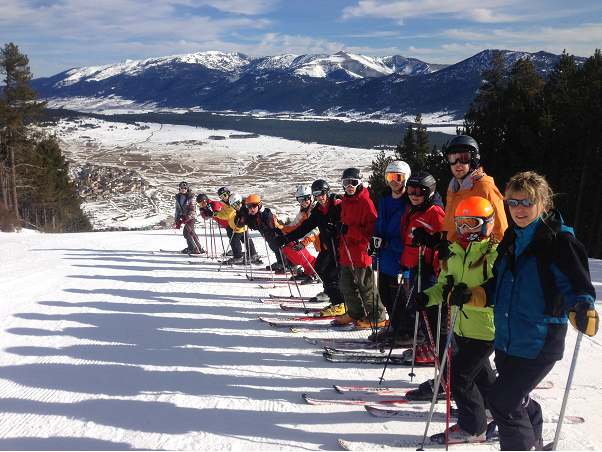
One of the aspects that makes the CAPS Home to Home experience so unique is that you have the opportunity to become a part of a Spanish family during your stay here. Living with three different host families (in my opinion) is one of the best ways to learn about the local culture and lifestyle. Throughout the year I will live with three different families (I am currently with my second), each one providing new knowledge and experiences. As I mentioned, this can be a rewarding experience, but it needs to be said that it can also be one of the most challenging aspects of this program. There are many differences that you must adapt to and you have to be prepared for these. In some cases, these challenges can be overcome, but other times you must have to be able to deal with a difficult situation.
All of the experiences I have accumulated as a part of this program are invaluable to me. I have learned so much about myself and I have grown and matured in many ways. I would recommend this experience to anyone who is adventurous, adaptable and looking for a challenge.
By júlia verdaguer, on maig 10th, 2013% Col·legi Sant Josep is hosting their first Conversation Assistant this year: Emma. She comes from the UK and works with pupils from Infant School to 4th of ESO. They have sent Emma’s thoughts on the program along with some beautiful photos. Thank you very much!
……………………………………………………………………..
Hello,
My name is Emma Harris and I’m working as a conversation assistant in Col.legi Sant Josep in Gracia, Barcelona. I’ve been here since September, helping out with all ages’ English classes. The children here range from about 6 months old to 16 years, so my experience has been varied but very enjoyable so far. I’m having a wonderful time with constant support from the school and the families. I’ve felt very welcomed into the community here and highly recommend the experience.
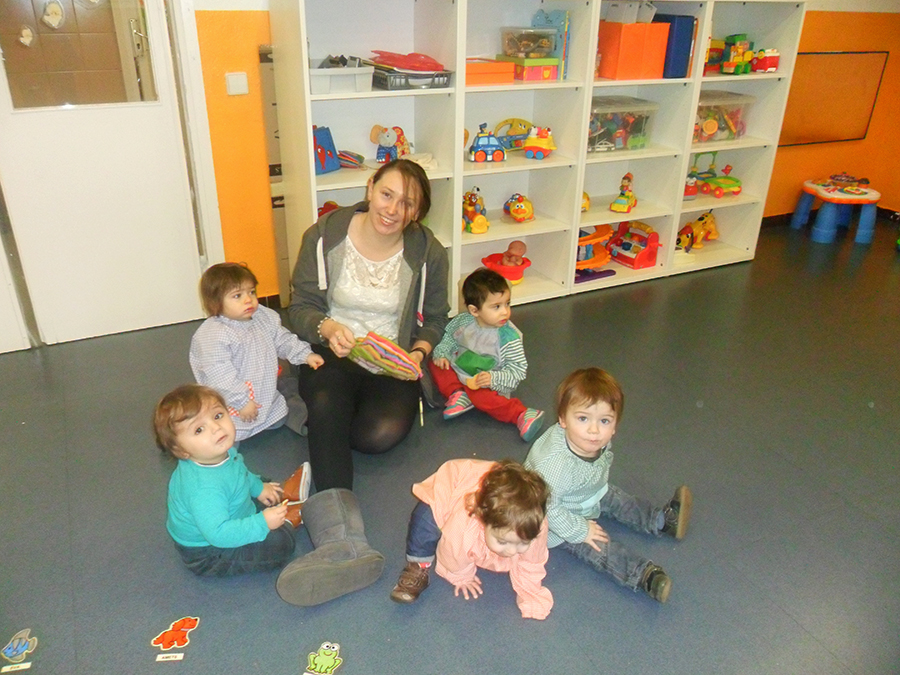 Emma with her youngest and tiniest students
Through the use of games, different activities, music, conversation classes and much more I’ve been assisting in all English classes as well as some music and science lessons to vary the English that the students learn.
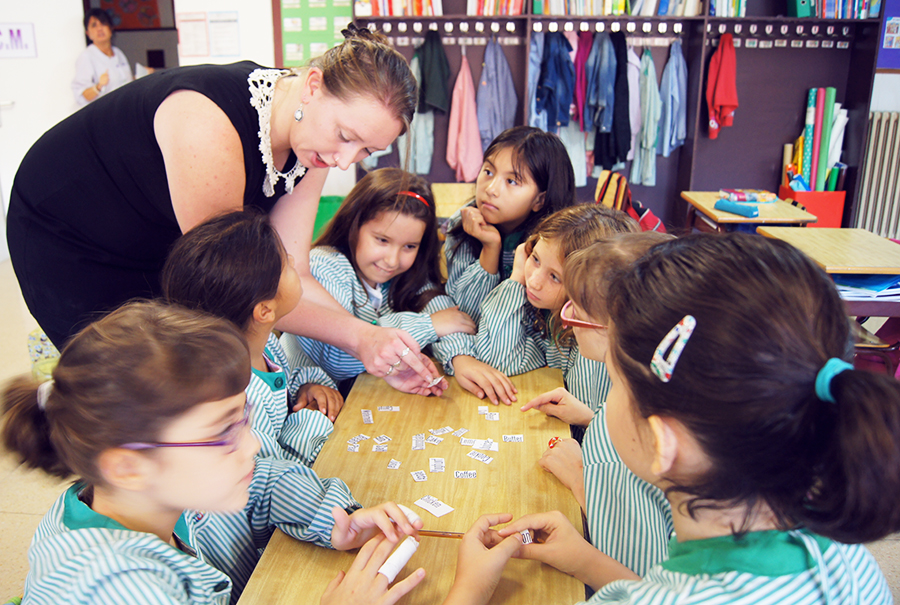 Emma with some Primary students Fortunately, for me, I already knew Castilian before coming to Barcelona but since arriving I’ve been learning Catalan and more and more about the culture and the people. It has been very interesting and everyone has been very willing to help me or to invite me to get to know their lives here. In exchange, with my host families and at school, I try to bring a part of my culture to them, through activities, games, songs and food.
In Sant Josep, we’ve also introduced this year the ability to take Cambridge exams from 5è to 4o Eso, for which I take small groups of students to revise any points of grammar or vocabulary and to practice speaking for the exams.
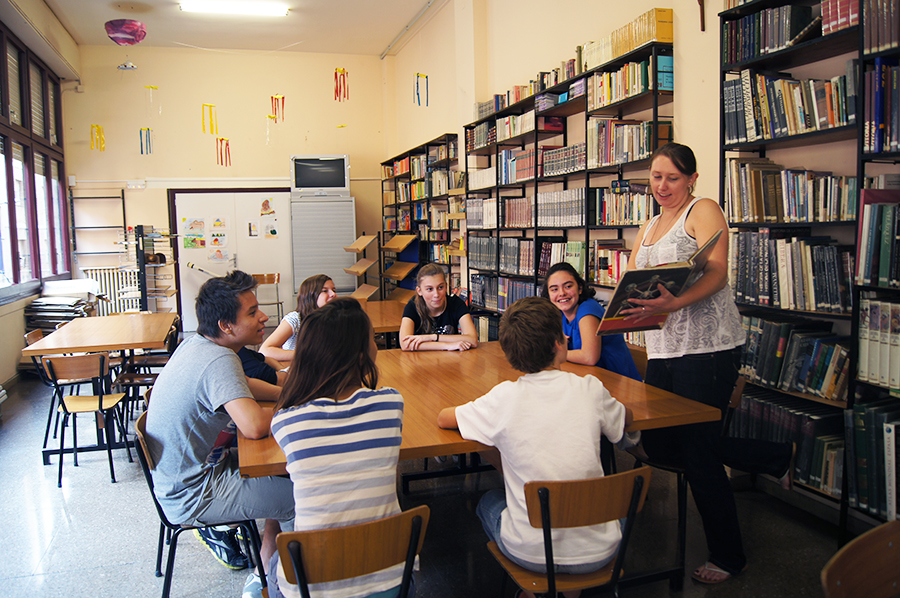 Working with a small group of ESO students So, to anyone thinking about either taking on a conversation assistant or becoming one, I would recommend the idea, be prepared for a challenge but one that will enrich not only the learning of students at school but also your own!
Thanks.
By júlia verdaguer, on maig 8th, 2013% Padre Damián Sagrados Corazones, in Barcelona, is one of the veteran schools in the PAC. They have hosted many conversation assistants, you can read all about them in their Multilingual Blog!
And now, let’s hear what their three newest conversation assistants thought during their first days in the school:
 Hi guys! We are the new conversation assistants; Jonathan, Danny and Megan! We have the pleasure of taking over from the girls and after our first week we have already been made to feel very comfortable by the staff and the students. We were taken aback by the warm and excitable welcome we received from the students, which seems to be on-going as we are yet to introduce ourselves to all the classes. We have been impressed by the level of English that many students have and we plan helping them build on this knowledge through our own enthusiasm to converse. There is a positive attitude to learning English at Padre Damian SSCC which has added to the great working environment we have come across. We plan on making our classes as fun as possible while speaking as much English as we can. Thank you for the opportunity, we can’t wait to see what the next few months have in store for us. Hi guys! We are the new conversation assistants; Jonathan, Danny and Megan! We have the pleasure of taking over from the girls and after our first week we have already been made to feel very comfortable by the staff and the students. We were taken aback by the warm and excitable welcome we received from the students, which seems to be on-going as we are yet to introduce ourselves to all the classes. We have been impressed by the level of English that many students have and we plan helping them build on this knowledge through our own enthusiasm to converse. There is a positive attitude to learning English at Padre Damian SSCC which has added to the great working environment we have come across. We plan on making our classes as fun as possible while speaking as much English as we can. Thank you for the opportunity, we can’t wait to see what the next few months have in store for us.
By júlia verdaguer, on maig 7th, 2013% The school FEDAC Sant Feliu, in St. Feliu de Codines, is hosting a Conversation Assistant for the first time this year. Her name is Rachel, she comes from the UK and feels very welcome in Sant Feliu. She works with pupils from P3 to 1st of ESO and all of them really enjoy their time with her. Thank you for sharing your experience with us!
……………………………………………………………………………
Hello!
I’m Rachel, I’m 21 years old and I currently live in Sant Feliu de Codines. I originally live in Leeds in the north of England, but for the last 6 months I have been calling this small town outside Barcelona, home. I arrived in Barcelona with no expectations of what would happen next. I had only been on holiday to the Spanish islands before, and so to come and live here, knowing no Spanish or Catalan was a big step! But the choice I made couldn’t have been better. I work in a small school called FEDAC – Sant Feliu de Codines.
I have always wanted to work with children since the age of 14, and after completing a degree in psychology and having a particular interest in educational psychology, I decided to take the plunge and apply for the job here. After graduating I wanted to get experience working in a school, and I always had an interest in working abroad and indulging myself in another culture. But even after the culture difference I couldn’t be any happier here!
As soon as you arrive in this city, there is a constant welcoming feeling from everyone around you. The people in my town are very traditional and nothing is ever too much effort. I am now 6 months into my experience and it is still the same as day one. The people here always want to help, and for this reason I don’t think that people who come in future should worry about the differences, even when you have bad days or you miss home, the people always know how to make you happy and smile again.
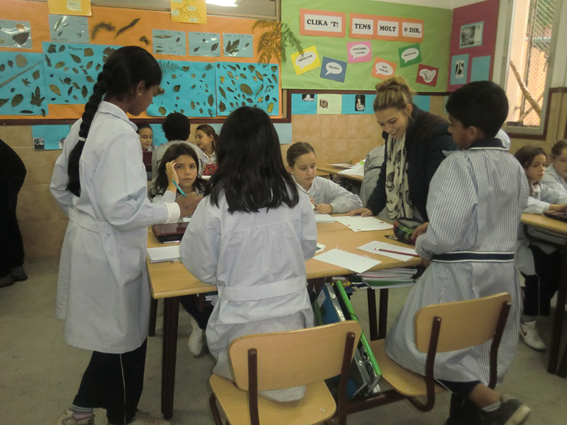
The school I work at is called ‘Immaculat cor de Maria’, and it is very small but the feeling is like a little family! When I first arrived the children were very friendly and they were always shouting my name and asking questions! But even 6 months on this is still the same, and they are as intrigued with me and my culture as I am about them and theirs. They have certainly made me feel very welcome here. My job at the school is to assist with English and conversation. Every day I take out 4 or 5 children from the classes, for around 15 minutes at a time. I do activities to practice English through verbs, nouns, adjectives, prepositions, grammar and more, but I also like to focus on pronunciation. My typical day includes working with all ages of children and I work with P-3 to the 1st ESO. In the P-3 class I work in the classroom and practice small vocabulary such as colours and weather. In all the other classes I take the children out and do a small activity, with P-4 and P-5 it is usually flash cards telling stories and practicing. From 1n to the 4t primary school, I work on activities such as worksheets regarding the unit, which might include word searches, stories, pictures, games and activities. With the older children the level is much more advanced, and I hold competitions between to make them more motivated and they all love being competitive! I like to keep them motivated and I want to make them enjoy English! I do powerpoints or board games and ask them to explain in English the rules of the game. I also do reading comprehension and much more with this age range. I plan most of my classes around the units that they study in the class, this is so that I can reinforce the curricular and hopefully help them learn better and help understand English more. Teachers have told me that the children go back into the class or go home and talk about what they have done, all in a positive way! So this is a good outcome of my classes!
The family I live with couldn’t be any better, I stay with the director of primary school and her family. They are my second family now and mean a lot to me. Everything they have done and how welcoming they are couldn’t be any better. I have been made to feel like their daughter and I can see how I have improved their English, but also they have taught me some Spanish and of course a little Catalan! But that is the culture here, to make you feel so welcome and like you are at home.
Overall my experience of CAPs is very positive, I love the school, my family, the teachers and the students. I am very happy and I am looking forward to the rest of my time here. Especially when the sun gets hot!
By júlia verdaguer, on abril 26th, 2013% Què cal per acollir un Auxiliar? Com ens hi entendrem? Com serà la vida de cada dia (menjar, roba, dormir, transport…)? I els caps de setmana? L’hem d’acompanyar a tot arreu? I a l’escola, què ha de fer el tutor de l’Auxiliar? Què pot fer un auxiliar? Com hem d’organitzar la seva estada? Com podem facilitar la seva integració? Quin suport tenim de l’organització?
 Aquestes són algunes de les preguntes més freqüents que es fan les escoles i les famílies acollidores sobre el Programa Auxiliars de Conversa. Per tal de resoldre aquests i altres dubtes, des de l’organització del PAC hem convocat quatre sessions informatives obertes a tothom: famílies acollidores, famílies interessades, direccions i mestres d’escola, etc. En aquestes reunions parlarem de què suposa acollir un auxiliar de conversa a casa, com podem facilitar la seva integració a la família i al nostre país i donarem algunes pautes i recursos sobre com facilitar l’adaptació de l’Auxiliar de Conversa a l’escola i a les seves tasques i treure el màxim profit de la seva estada. També donarem, és clar, resposta a totes les preguntes que pugueu plantejar-nos. Aquestes són algunes de les preguntes més freqüents que es fan les escoles i les famílies acollidores sobre el Programa Auxiliars de Conversa. Per tal de resoldre aquests i altres dubtes, des de l’organització del PAC hem convocat quatre sessions informatives obertes a tothom: famílies acollidores, famílies interessades, direccions i mestres d’escola, etc. En aquestes reunions parlarem de què suposa acollir un auxiliar de conversa a casa, com podem facilitar la seva integració a la família i al nostre país i donarem algunes pautes i recursos sobre com facilitar l’adaptació de l’Auxiliar de Conversa a l’escola i a les seves tasques i treure el màxim profit de la seva estada. També donarem, és clar, resposta a totes les preguntes que pugueu plantejar-nos.
Les sessions informatives programades són les següents:
Tarragona
Dimecres 8 de maig | 17:30h
Escola Vedruna-Sagrat Cor
Santa Joaquima Vedruna, 10 |
Girona
Dilluns 13 de maig | 17:30h
Escola Maristes Girona
Josep Tarradellas, 5-7 |
|
|
Barcelona
Dimecres 15 de maig | 18:00h
Escola Pia Balmes
Balmes, 208 |
Lleida
Dilluns 27 de maig | 17:30h
Escola Lestonnac-L’Ensenyança
Prat de la Riba, 38 |
Podeu descarregar-vos un model de circular i un cartell per a promocionar les sessions en els següents enllaços:
> Model circular PDF
> Model circular word
> Cartell PDF
> Cartell word
Us animem a fer-ne difusió entre les famílies de les vostres escoles, i també us animem a venir a les sessions informatives, tant les escoles que voleu participar per primera vegada al PAC com les que ja heu tingut Auxiliars de Conversa els darrers anys.
Les sessions tenen caràcter informatiu. Per tant, l’assistència no implica cap compromís d’acollida posterior d’un Auxiliar de Conversa. Per facilitar la nostra organització, us preguem que confirmeu la vostra assistència al correu pac@escolacristiana.org, indicant a quina de les sessions assistireu i quantes persones vindreu.
Recordeu-vos també de consultar les novetats del Programa per al curs 2013-14!
|
|


























